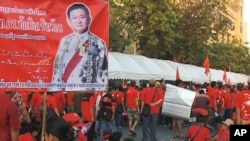Thailand is again gripped by political unrest. But unlike some previous demonstrations, which were mainly seen as part of former Prime Minister Thaksin Shinawatra's struggle against those who deposed him, political analysts say the new rallies have become a forum for people who feel marginalized and want broad political change.
Tens of thousands of Thais poured into Bangkok over the past week demanding fresh elections.
The red-shirted protesters are usually associated with former Prime Minister Thaksin Shinawatra, who was ousted in a coup in 2006.
But many do not care about Mr. Thaksin. They want elections because they think the government does not serve the poor.
PROTESTER: "If we have election, and I have the government be mine, be ours, it's good, better than now."
After court cases forced out an elected government in 2008, parliament selected Prime Minister Abhisit Vejjajiva, under rules set up by the military government that ousted Mr. Thaksin.
Pan, a maid, is one of the thousands of people who cheered as the demonstrators paraded in Bangkok. She wants a new election because she thinks Mr. Abhisit is insensitive to the needs of the poor.
"He [says] to people he [will] do this and do this, but he [does] not do…. He lied to people, he lied to [the] people of Thailand," she said.
Chulalongkorn University political science professor Naruemon Thabchumpon says many people do not directly benefit from the government's economic programs.
"I think this is the big problem of the Abhisit government because his government still believes in trickle-down effect," she said. "Basically, his stimulus economic package only goes to formal sector of the economy."
But 62 percent of Thai workers are in the informal sector, such as contract workers, farmers, street hawkers, and motorcycle-taxi drivers. And she says they dominate the protesters.
Naruemon thinks the protesters carry diverse grievances that have found a common identity.
While Prime Minister Abhisit says he will not call elections under pressure, he acknowledges the grievances of many of the protesters. He says the government is working to solve issues such as the income gap and poor housing.
But without real progress, political analysts and voters say the government will find it difficult to convince people like Pan, who says she wants to vote for a leader who responds to her needs.




